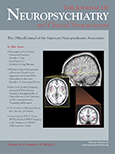Aripiprazole Monotherapy Can Relieve Ruminations in a Case With Nonpsychotic Depression
To the Editor: Major depressive disorder is linked with stressful events and increased engagement in ruminations, which is a possible candidate for the psychological pathogenesis of major depressive disorder.1 Here, the authors share a patient with nonpsychotic major depressive disorder who received aripiprazole monotherapy and had a response of depression symptoms and ruminations.
Case Report
“Mr. J” is a 37-year-old male patient with major depressive disorder who received antidepressant treatment for 2 years without significant improvements of his depression symptoms (Hamilton Rating Scale for Depression score: 27). The name and approximate treatment duration of the antidepressants are as follows: sertraline, 150 mg/day for 6 months; escitalopram, 20 mg/day for 3 months; bupropion, 300 mg/day for 3 months; duloxetine, 120 mg/day for 6 months; and venlafaxine, 225 mg/day for 6 months. He complained of the gastrointestinal side effects of the antidepressants. Other than the major depressive disorder symptoms, he had significant brooding ruminations, such as “repetitively thinking how lonely he feels,” “what is he doing to deserve this major depressive disorder,” and “why can’t I get going.” The scores of the 22-item Rumination Response Scale were 59. For the past treatment-resistant characteristics and intolerable side effects of the antidepressants, he started to receive aripiprazole monotherapy as 5 mg/day. After the 3-month treatment, his major depressive disorder symptoms gradually responded (Hamilton Rating Scale for Depression scores: 27 → 15; Rumination Response Scale scores: 59 → 38; “repetitively thinking how lonely he feels” item scores: 4 → 1; “what is he doing to deserve this major depressive disorder” item scores: 4 → 2; “why can’t I get going” item scores: 4 → 1). No intolerable side effects were mentioned.
Discussion
Recently, it has been understood that major depressive disorder is mediated and formed by ruminations and reappraisal mechanisms.2 Higher levels of depression are associated with decreased connectivity between the anterior cingulate cortex and the middle frontal gyrus. The severity of ruminations in major depressive disorder is also inversely correlated with the functional connectivity between the anterior cingulate cortex and frontal regions.3 A meta-analytic structural study of major depressive disorder showed decreased gray matter in the anterior cingulate cortex.4 Pizzagalli also mentioned that the brain activity of the anterior cingulate cortex could predict treatment response, and fronto-cingulate dysfunctions would be a model for the pathophysiology of major depressive disorder and the treatment response.5 The severity of ruminations seemed to be related to a decreased ability of the anterior cingulate cortex to modulate the functional connection to the amygdala and dorsolateral prefrontal cortex.5 Han et al. reported that the combination treatment of aripiprazole and escitalopram would modulate the activities of the anterior cingulate cortex for the presentation of alcohol cue in the alcoholic patients comorbid with major depressive disorder.6 Aripiprazole might relieve the ruminations through enhancement of cerebral blood flow in the anterior cingulate cortex.7 Schlagenhauf et al. also reported that aripiprazole treatment could normalize the deficits of working memory tasks and the hypoactivity of the anterior cingulate cortex.8 Apart from the above neuroimaging evidence, aripiprazole’s D2 partial agonist, 5-HT1A partial agonist, 5-HT2C antagonist, and 5-HT2A antagonist theory contributes to its therapeutic role for ruminations in major depressive disorder.9
1 : Rumination as a mechanism linking stressful life events to symptoms of depression and anxiety: longitudinal evidence in early adolescents and adults. J Abnorm Psychol 2013; 122:339–352Crossref, Medline, Google Scholar
2 : Mindfulness and emotion regulation in depression and anxiety: common and distinct mechanisms of action. Depress Anxiety 2013; 30:654–661Crossref, Medline, Google Scholar
3 : Resting-state functional connectivity of subgenual anterior cingulate cortex in depressed adolescents. Biol Psychiatry 2013; 74:898–907Crossref, Medline, Google Scholar
4 : Gray matter volume in major depressive disorder: a meta-analysis of voxel-based morphometry studies. Psychiatry Res 2013; 211:37–46Crossref, Medline, Google Scholar
5 : Frontocingulate dysfunction in depression: toward biomarkers of treatment response. Neuropsychopharmacology 2011; 36:183–206Crossref, Medline, Google Scholar
6 : Adjunctive aripiprazole therapy with escitalopram in patients with co-morbid major depressive disorder and alcohol dependence: clinical and neuroimaging evidence. J Psychopharmacol 2013; 27:282–291Crossref, Medline, Google Scholar
7 : Acute effects of single-dose aripiprazole and haloperidol on resting cerebral blood flow (rCBF) in the human brain. Hum Brain Mapp 2013; 34:272–282Crossref, Medline, Google Scholar
8 : Switching schizophrenia patients from typical neuroleptics to aripiprazole: effects on working memory dependent functional activation. Schizophr Res 2010; 118:189–200Crossref, Medline, Google Scholar
9 : Aripiprazole in the treatment of depressive and anxiety disorders: a review of current evidence. CNS Drugs 2008; 22:367–388Crossref, Medline, Google Scholar



